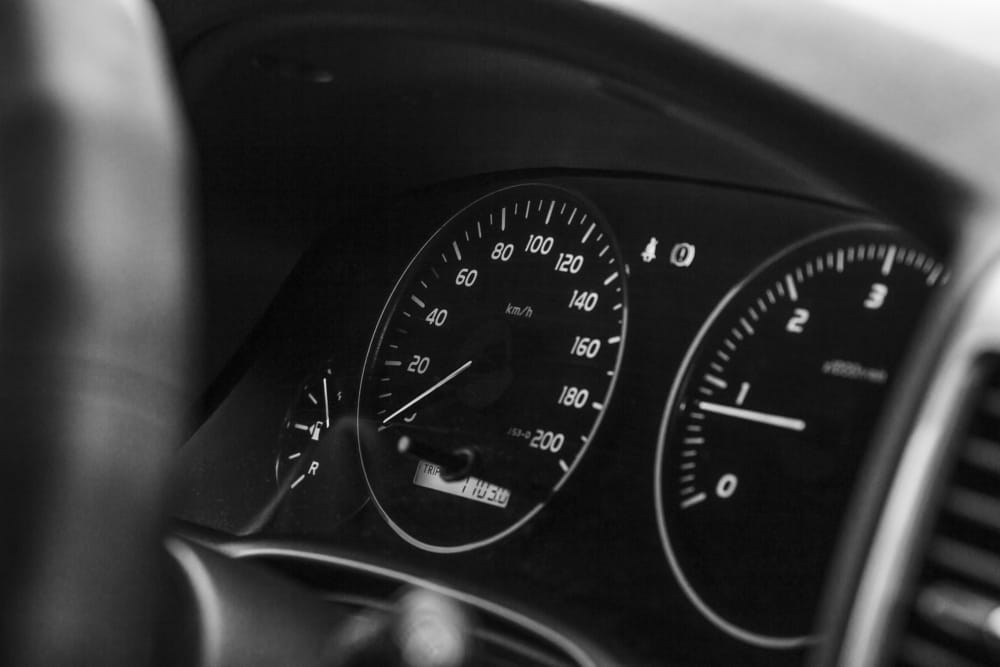

The electronics in today's cars and trucks are extremely complex. However, one of the simplest devices we rely on to deliver us factual data is the speedometer. Essentially, the speedometer is powered by three independent components; the speedometer on the dashboard, the cable attached from the speedometer to the driveshaft and the speedometer sensors attached to the driveshaft to measure speed. Some speedometer issues are due to dirty or faulty sensors that relay false data through the cable and eventually show up on the dashboard.
Where is the speedometer sensor located?
The speedometer sensor is located in the transmission of your vehicle and is designed to register the driveshaft’s rotational speed. The sensor delivers this information through the speedometer cable and to the vehicle’s computer, which converts electrical pulses into a numerical speed. Eventually that number is displayed on the speedometer and tells you precisely how fast you are driving. If the speedometer sensor is not working properly, the speedometer will be inaccurate; potentially leading to speeding tickets or unsafe driving situations.
The symptoms noted below will give you an indication that a problem exists with your speedometer sensor:
1. Speedometer does not work
Whether you have a digital or manual speedometer, if it's not displaying accurate information, it doesn't really help you. One of the biggest signs your speedometer sensor is not working properly is the speedometer will display inaccurate readings or the needle or digital numbers will not move at all on the speedometer display. A malfunctioning speedometer sensor can also cause a speedometer to act erratically, fluctuating the reading from one speed to another; even though in reality you're not speeding up or slowing down.
If you feel you are driving faster or slower than what the speedometer reads, it is a good idea to have your vehicle inspected by Your Mechanic, as this might be a problem with the sensor that can be repaired or an indication that the speedometer sensor needs replacement. Being proactive about repairing your speedometer issue can improve safety, not only for you, but others on the road. It can also reduce the potential of getting two citations; one for speeding and another for a damaged speedometer.
2. Cruise control does not work
The speedometer sensor is also a critical component in the proper operation of a vehicle’s cruise control. When the sensor is not working correctly, it will not send a signal to the CPU, which impacts the vehicle’s ability to set the throttle for a desired speed. As a safety measure, automotive manufacturers engineer the cruise control in a way that if the speedometer sensor is acting up, it won't engage the cruise control at all. On most cars sold today, this will be indicated by the cruise control light being illuminated on the dashboard - even if it's not engaged. If you experience this problem, it's possible that the speedometer sensor needs to be replaced.
3. Check Engine Light comes on
The speedometer sensor is located inside the transmission and attached to a driveshaft, which impacts multiple functions of the car. Due to this fact, it's possible that the Check Engine Light will light up on the dashboard if a sensor problem is discovered by the vehicle's CPU. Regardless of why the check engine light is illuminated, it's never a good thing, nor should it be avoided. If the check engine light shows up anytime, contact a mechanic as soon as possible so they can diagnose the problem with the correct diagnostic tools. Sometimes the issue is small and the CPU needs to be reset; but don't take that risk.
4. Vehicle loses power
Today's cars and trucks have electronic fuel injection, which is controlled by the onboard computer. The EFI supplies fuel to the engine based on input from multiple sensors; one of which is the speedometer sensor. If you notice that your car starts to lose power; especially when you apply pressure to the throttle, this might be caused by a damaged or malfunctioning speedometer sensor. This problem could be potentially harmful to other mechanical components on your vehicle, so don't ignore the issue. Contact a certified mechanic as soon as possible to determine what is causing this issue.
As you can see, the speedometer sensor impacts the operation of multiple components that allows you to efficiently operate your car or truck. Anytime you experience any of the above warning signs, contact a professional mechanic to properly diagnose and repair the issue.



